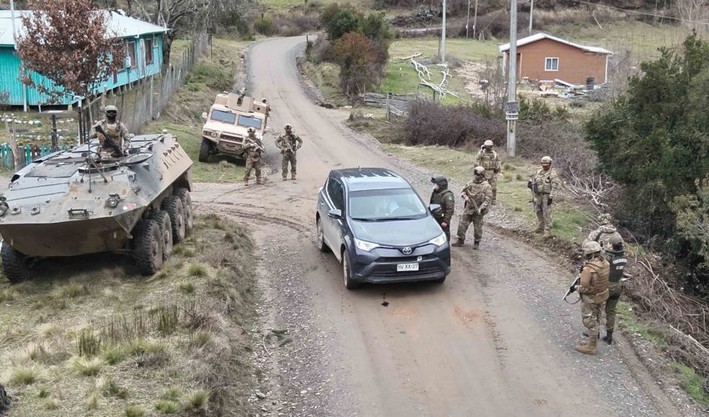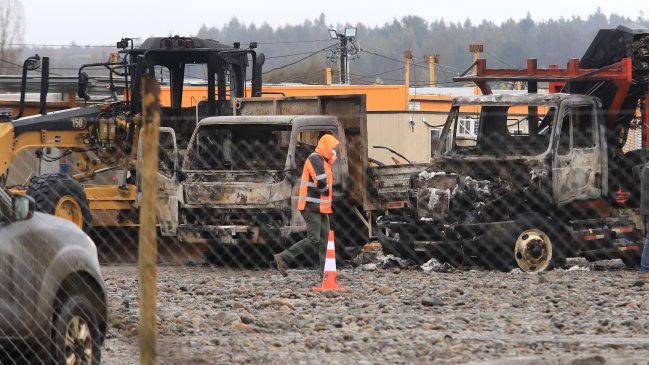The State of Constitutional Emergency in the Southern Macrozone—specifically in the Biobío Region, in the provinces of Arauco and Biobío, and in the La Araucanía Region—has been extended sixty times. This week, the Senate approved its extension with 32 votes.
In the Upper Chamber, they highlighted the decrease in violent incidents and began analyzing "exit strategies" for the 3.5-year-long State of Exception. This goes hand in hand with measures that open the possibility to "consider a reduced military and police presence."
It should be noted that, according to figures presented by the Government during the vote for the new extension, as of August 10, 2025, there has been a 39% decrease in rural violence events compared to the same period in 2024, and an 80% decrease compared to 2021.
Thus, from the legislative side, there was a call to expedite projects such as the Rules on the Use of Force (RUF) and the modernization of the Intelligence Law.
Despite the reduction in violence, legislators noted that armed groups persist: "Throughout all these years under the state of exception, little has been done to limit these groups' access to weapons or bring them to justice."
The Minister of the Interior, Álvaro Elizalde, stated that an evaluation is currently being conducted to analyze the possibility of de-escalating the measure in light of the decrease in rural violence incidents.
"An evaluation is being carried out to adopt the necessary measures for better results, and on that basis, we believe it is necessary to design a de-escalation plan that allows for a perspective where this exceptional measure remains truly exceptional and does not become permanent," said Elizalde.
However, the Secretary of State emphasized that "with the same honesty, it must be said that as long as this measure is necessary, we will have to extend it, because the number one priority here is the priority of the people."
In the Area
Meanwhile, Biobío Region Senator Gastón Saavedra (PS) referred to the possibility of implementing de-escalation measures and stated, "I proposed de-escalation in municipalities without conflict, but I voted in favor of maintaining the State of Constitutional Emergency."
Along the same lines, Saavedra suggested that "the territorial extension, especially in the Biobío Region in places like Yumbel, Cabrero, and Laja, could easily be lifted, as it makes little sense to have police and military forces deployed in territories where normal surveillance is sufficient, and we should instead focus on other areas where terrorist activities are primarily occurring."
The parliamentarian also highlighted the dialogue instances that have been initiated to discuss possible measures to end the State of Exception in the mentioned area. Lastly, Saavedra added that it is key for all involved actors to be part of the analysis.
"I agree with President Boric’s initiative to convene this dialogue with representatives from diverse backgrounds, including indigenous peoples, business owners, and members of various communities. This benefits the country and the resolution of the conflict," concluded the senator.
At the same time, fellow Biobío Senator Enrique van Rysselberghe (UDI) argued that a potential phased exit from the State of Exception cannot be executed in the short term, noting that every time the idea is raised, violence recurs.
"Every so often, the government and related sectors suggest the need to begin de-escalating the measure in the Southern Macrozone, but new attacks on public or private property occur, demonstrating that such measures cannot be implemented in the short term," explained the parliamentarian.
For van Rysselberghe, the main requirement to end the constitutional measure is "for the Government to focus all its efforts on dismantling, arresting, and bringing to justice the terrorist cells that remain operational in the territory."
Thus, the Upper House member asserted that, until this condition is met, "it is entirely unacceptable to end the State of Constitutional Emergency, as we would return to the previous scenario where terrorist groups operate with impunity in territories without state control or presence."
Communities
The mayor of Santa Bárbara, Cristian Oses, commented on the idea. It is worth recalling that in April of this year, his municipality experienced an arson attack that destroyed 51 machines at the Rucalhue power plant, an incident classified as extremely serious.
Regarding the idea proposed by the Executive and the Senate, the municipal leader stated that "as long as there is no legal modification or change in the guarantor approach within our legal procedural system, or a lack of intelligence to anticipate these criminal problems that threaten the security of the country’s municipalities, it will be difficult to replace the state of exception with another measure."
Additionally, Oses added, "We call on parliamentarians to draft legislation that considers people’s reality; we need signals that will toughen this."
It is important to remember that the measure was implemented on May 18, 2022, 66 days after President Gabriel Boric’s government began. Similarly, the Armed Forces are also deployed in the regions of Arica and Parinacota, Tarapacá, and Antofagasta under the "critical infrastructure" system.
Source:Diario Concepción







Comments (0)
No comments yet. Be the first to comment!
Leave a comment